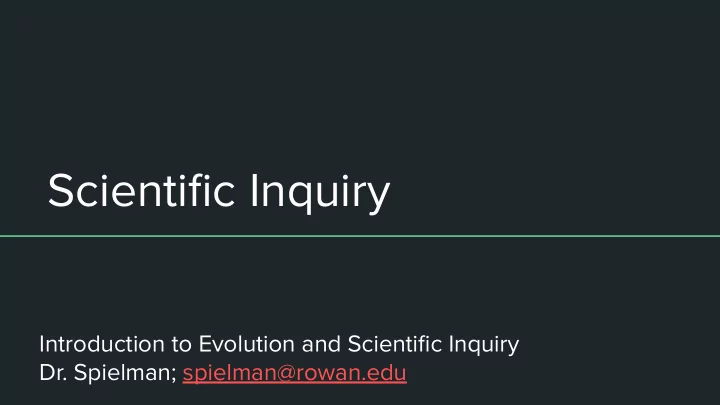

Scientific Inquiry Introduction to Evolution and Scientific Inquiry Dr. Spielman; spielman@rowan.edu
The hypothesis-driven scientific method ● Make observation(s) Ask a question ● ● Form a scientific hypothesis ● Design an experiment to test whether data supports the hypothesis ● Perform the experiment; collect and analyze the data Draw conclusions ● ● Reproduce results
Scientific Hypotheses ● To be scientific , a hypothesis must be testable and falsifiable. ● Yes: Fruit flies prefer to eat bananas over apples. Yes: The earth is roughly 4.5 billion years old. ● No: Loch Ness contains a giant reptile/monster. ● ● No: Ghosts live in haunted houses.
Scientific Hypotheses ● The goal of the scientific method is to test for whether there is evidence for the hypothesis. NOT TO PROVE!!! NOT TO PROVE!!!! WE NEVER EVER PROVE!!! ●
Developing a scientific hypothesis https://www.youtube.com/watch?v=Uc7Ahp5--eE What are your observations ? What questions could we ask? What are the scientific hypotheses to test these questions?
Directional vs nondirectional hypotheses ● We observe that cheetahs run more quickly than gazelles do. ● Nondirectional hypothesis: Cheetahs and gazelles run at different speeds. ○ Directional hypothesis: ● ○ Cheetahs run faster than gazelles do. ○ Cheetahs run slower than gazelles do ● All match with this null hypothesis: ○ There is no difference between the speed at which cheetahs and gazelles run.
We "pair" the hypotheses with a null hypothesis ● Null hypotheses are used in formal statistical testing. "Nothing special is going on whatsoever". ○ ○ "X has no effect on Y". ● Technically, the actual hypothesis we test is called the alternative hypothesis ● We are NOT comparing between the null and alternative!! We are ONLY testing for evidence for the alternative!! ○ So, what gives with this null hypothesis lesson?
Developing an experiment to test whether there is evidence for the hypothesis ● An experiment needs several key components for it to be scientifically reliable ○ There must be treatment group(s) and a control group ○ The experiment must have repetition, i.e. replication (more than one individual/group is examined) ○ The experiment must be randomized ("unbiased") ○ The experiment must be reproducible (someone else can repeat your experiment)
Types of experiments ● Controlled or manipulative experiment (we're talking about this!) ● Natural or observational experiment ● ...The other kind of observational study
Example experimental scenario Alternative hypothesis : Using rocks improves otters' ability to open clam shells. Null hypothesis : Using rocks does not affects otters' ability to open clam shells. Experiment: We randomly place 10 otters into "treatment group" and 10 otters into "control group." All otters are provided with delicious, delicious closed-shell clams. We give each otter in the treatment group a rock, but we do not give any rocks to the control group otters. We measure how many otters in each group successfully eat their clam. We repeat this experiment five times, using 20 randomly-chosen different otters each time.
What is the purpose of experimental design? We use control groups to isolate what we are testing. ● ○ Control and treatment groups should be as similar as possible, with the only difference being what we are testing. We randomize to minimize bias and random error. ● Bias : Systematic (or nonrandom) variation in treatment groups ○ ○ Random Error : Random variation in groups, measurements. Often stems from individual or environmental variation . ● We include repetition (replication) to further reduce random error due to individual variation .
Special names for variables in your experiment ● Response variable: What we are actually measuring (be specific!) AKA "dependent" variable ○ ● Independent variable: What quality differs among treatment and control groups? I.e. what are we testing?
Confounding factors ● Anything that could confound your ability to cleanly interpret your experimental results ○ Confound = to fail to find differences between (think: diff between control and treatment)
Pop Quiz! (not really) ● If the alternative hypothesis is false , does that mean the null hypothesis is true ? If our results support the alternative hypothesis, does that mean the alternative ● hypothesis is true ? ● How do we know for sure if the alternative is definitely true or false?
Forming conclusions ● The results support/show evidence for the alternative hypothesis. Different results between control/treatment groups, AND difference favors the hypothesis. ○ ● The results do not support/do not show evidence for the alternative hypothesis. No difference between control/treatment groups. ○ ○ Different results between control/treatment groups, BUT difference disagrees with the hypothesis. ( Is this bad?) The results prove the hypothesis is true. The results prove the hypothesis is false. The results show evidence for the null hypothesis.
Alternative hypothesis: Using rocks improves otters' ability to open clam shells. Example results Replicate # successful # successful Supports alternative What can we control otters treatment otters hypothesis? generally (out of 10) (out of 10) conclude? 1 5 6 2 7 3 3 8 8 4 1 2 5 2 9
Recommend
More recommend